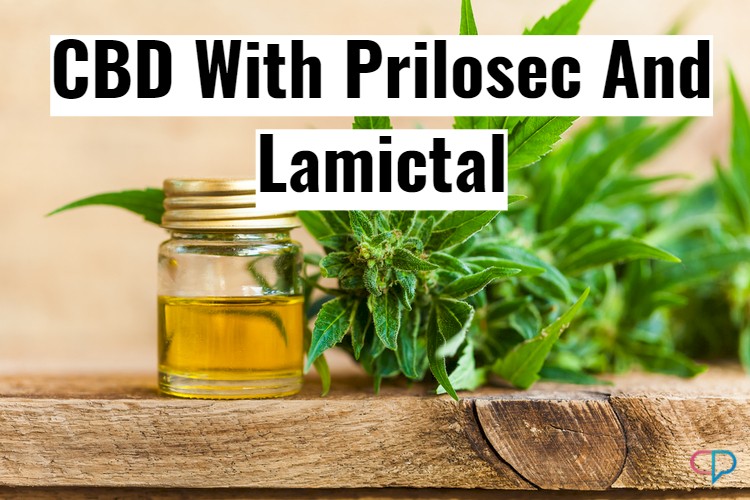Mazy asked
I read your article about possible drug interactions with CBD oil. I'm still confused. I take 50 mg of CBD oil per day in addition to 40mg of Prilosec once a day and 100mg of Lamictal twice per day. It appears to me after reading your article that the Prilosec increases the amount of CBD in my bloodstream but it inhibits the amount of Lamictal in my bloodstream. Is that correct?
At a glance
- Based on the known metabolism of CBD (cannabidiol), Prilosec (omeprazole) and Lamictal (lamotrigine), there are several potential interactions to be concerned with. CBD may increase blood concentrations of both Prilosec and Lamictal due to enzyme inhibition, but more studies are needed to confirm this.
Answer

Thank you for reading one of our articles regarding CBD (cannabidiol) interactions. I am more than happy to elaborate on any specific drug interaction you are concerned with.
Based on your question, you are concerned with the use of two drugs with CBD, Prilosec (omeprazole) and Lamictal (lamotrigine), so I will cover both of those for you.
Before discussing those two drugs, it is important to point out that drug interaction studies concerning CBD are lacking. Most potential interactions with CBD are based simply on what we know about its metabolism and the metabolism of other drugs.
Very few studies exist that explore CBD interactions with specific drugs. Currently, the most well-documented interactions are with certain anticonvulsants, like Onfi (clobazam)[1], valproate, Topamax (topiramate) and Zonegran (zonisamide)[2].
Having said that, let's take a look at Prilosec and Lamictal.
CBD With Prilosec
Prilosec (omeprazole) is a PPI (proton pump inhibitor) that is used not only to help relieve the symptoms of heartburn but also to treat GERD, ulcers and a variety of excess acid-related disorders.[3]
Prilosec has been well studied in regard to its metabolism and potential drug interactions. One of the most commonly known interactions clinicians in all areas of practice are aware of is between Prilosec and Plavix (clopidogrel), an antiplatelet medication.[4]
Prilosec is known to inhibit at least two metabolizing enzymes:[5]
- CYP2C19
- CYP2C8
This is important since metabolizing enzyme inhibition is the most common mechanism behind drug interactions.[6]
If you take Prilosec in addition to a drug that is metabolized via CYP2C19 or CYP2C8, their blood concentrations could potentially be increased, which could increase the risk of dose-related side effects since they won't be metabolized as efficiently.
CBD (cannabidiol) is metabolized by a variety of enzymes, most notably CYP3A4 and CYP2C19.[7]
Theoretically, Prilosec, being an inhibitor of CYP2C19, could potentially increase CBD concentrations. The prescribing information for Epidiolex, a prescription CBD product, discusses this:[8]
"EPIDIOLEX is metabolized by CYP3A4 and CYP2C19. Therefore, coadministration with a moderate or strong inhibitor of CYP3A4 or CYP2C19 will increase cannabidiol plasma concentrations, which may result in a greater risk of adverse reactions [see Clinical Pharmacology (12.3)]. Consider a reduction in EPIDIOLEX dosage when coadministered with a moderate or strong inhibitor of CYP3A4 or CYP2C19."
Interestingly enough, there has been at least one study that reported that Prilosec did not affect CBD concentrations, even though, in theory, we could expect one:[9]
"...the moderate CYP2C19 inhibitor omeprazole [Prilosec], a proton-pump inhibitor used to treat gastroesophageal reflux disease, did not significantly alter the pharmacokinetics of CBD."
Clearly, more studies are needed to see if there truly is an interaction between CBD and Prilosec and whether or not it is clinically significant. Based on the information that is currently available, it doesn't appear to be overly concerning.
CBD With Lamictal
Clinical studies for cannabidiol show that it can inhibit an enzyme known as UGT2B7 (UDP-Glucuronosyltransferase-2B7).[10][11]
Lamictal is predominately metabolized by this enzyme. Therefore, there is the potential that CBD could increase concentrations of Lamictal (due to inhibition of its metabolism), increasing the risk of side effects.[12]
Like the potential interaction with CYP2C19 substrate drugs, the prescribing information for Epidiolex (the prescription CBD product) states the following regarding UGT2B7:
References
- ^ Drug-drug interaction between clobazam and cannabidiol in children with refractory epilepsy. PubMed
- ^ Interactions between cannabidiol and commonly used antiepileptic drugs. PubMed
- ^ Elsevier ClinicalKey: Prilosec Monograph. ClinicalKey
- ^ Clopidogrel-Proton Pump Inhibitor Drug-Drug Interaction and Risk of Adverse Clinical Outcomes Among PCI-Treated ACS Patients: A Meta-Analysis. PubMed
- ^ The effect of CYP2C19 polymorphism on the pharmacokinetics and pharmacodynamics of clopidogrel: a possible mechanism for clopidogrel resistance. PubMed
- ^ Drug interactions due to cytochrome P450. PubMed
- ^ Cannabinoids and Cytochrome P450 Interactions. PubMed
- ^ Epidiolex Prescribing Information. AccessFDA
- ^ Human Metabolites of Cannabidiol: A Review on Their Formation, Biological Activity, and Relevance in Therapy. PubMed
- ^ Characterization of Human Hepatic and Extrahepatic UDP-Glucuronosyltransferase Enzymes Involved in the Metabolism of Classic Cannabinoids. PubMed
- ^ Exogenous cannabinoids as substrates, inhibitors, and inducers of human drug metabolizing enzymes: a systematic review. PubMed
- ^ Lamictal Prescribing Information. AccessFDA
- ^ Lamotrigine: a review of its use in bipolar disorder. PubMed




